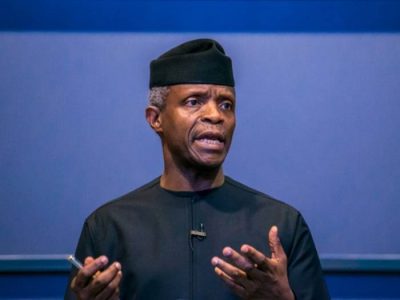Some states will collapse without federal allocations – Osinbajo
Vice President Yemi Osinbajo, on Thursday, said many states in Nigeria would collapse if they were denied allocations from the federation accounts for a single month.
He said the feeding bottle approach, though regrettable, depicts an economy that is less desirous for growth.
While taking a cursory look at the Western region during the days of Obafemi Awolowo, the number two citizen said the region carved a niche for itself using local resources and taxes from the people to foster growth in education, infrastructure, prospering the economy to the envy of other regions.
According to the Vice President, the growth trajectory at the federal level, following deliberate policies like the ease of doing business instituted by the Muhammadu Buhari administration, points to the fact that it could stand on its own, but same could not be said of the component states which live from hand to mouth.
Osinbajo made these remarks at the Leadership Awards, organised by the Leadership Newspaper Group, Abuja, where Governors of Rivers and Bayelsa states, Nyesom Wike, and Seriake Dickson, including other notable Nigerians were honoured.
According to the VP, periodic tax increases must be made a priority, if states were to escape the debt burden and provide basic amenities for their people.
His words: “On the 9th of May, 2018, while speaking at the opening ceremony of the 20th conference of the Chartered Institute of Taxation of Nigeria, I had occasion to refer to the remarkable achievements of Chief Obafemi Awolowo, as Premier of the then Western Region of Nigeria, from 1954-1960.
“The Western region is what today constitutes Oyo, Ogun, Ondo, Ekiti, Osun, parts of Kwara and Kogi, parts of Edo and Delta; Lagos, as far as Jibowu, some parts of Ikeja and Agege. The six-year period of the Awolowo government is often cited as one of the most progressive of any government in the developing world.
“Some of the major accomplishments of that government include the University of Ife (now Obafemi Awolowo University); the 26-storey Cocoa House, Ibadan, then, of course, an architectural wonder; Western Nigeria Television Authority, the first in Africa; the Ikeja industrial estate, several farm settlements, the Airport Hotel, Ikeja, several other industrial establishments – Oodua Textile Industries, Ado Ekiti, Okitipupa Oil Palm Mills, Oluwa Glass in Ifon, the ceramics industry there, Ire Ekiti Brick Industry, a network of roads across the region.
“But by far the most significant of these achievements is the Free Universal Primary Education. In 1952, when the scheme was proposed, 381,000 children, about 30% of children at the time, were enrolled in school. By 1955, when the scheme took off, 811,432 children were enrolled.
“And the number continued to grow. The Government devoted as much as 41.2% of the 1958/59 recurrent budget to Education, one of the highest in the world at the time. At the same time, the region nurtured a vibrant civil service and judicial system which is widely acknowledged as a model, even today.
“So how were Awo’s phenomenal achievements possible? There was no oil revenue, no Federal revenue. In fact, the Western Region government gave revenue to the federal government.
“How did they achieve financial viability? Mostly it was taxes and revenues from Agriculture, especially cocoa, and some from mineral resources.
“Free education, which was audaciously launched by that Government, was directly on the back of income taxes, a capitation or poll tax was imposed by the Western Region Government mainly to fund free education, despite much opposition and protests.
“But with Military rule from 1967, and oil money, everyone forgot about taxes. The Federal Government gave everyone an allocation.”


